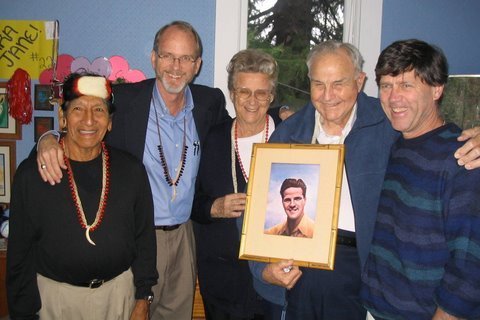Randy Alcorn's Blog, page 217
February 24, 2012
The History, Memories, and Nostalgia of "Real Books"
 I thought Kevin DeYoung’s post about “real books” (which I’ve included part of below) was interesting. I enjoy reading on my Kindle and iPad, and I love e-books, and haven’t given up on them, and doubt I ever will. But I still buy more printed ones, especially for research. If I believe I’m going to go back to the book, not just read it once, I tend to buy the printed version, which I mark up in a way that doesn’t work for me in the e-book equivalents to “making it my own.”
I thought Kevin DeYoung’s post about “real books” (which I’ve included part of below) was interesting. I enjoy reading on my Kindle and iPad, and I love e-books, and haven’t given up on them, and doubt I ever will. But I still buy more printed ones, especially for research. If I believe I’m going to go back to the book, not just read it once, I tend to buy the printed version, which I mark up in a way that doesn’t work for me in the e-book equivalents to “making it my own.”
I like what Kevin says about the history of certain books on the shelf. I like the different look and feel, even the bent up covers. I have books I read as a young Christian in high school, then in college, others as a young pastor. There are books I read to my daughters when they were three or five or seven. They are indeed like “old friends.” (The covers I’ve included in this post are some that bring back memories for me.)
 The books on my shelves convey a physical nostalgia, not just of content and characters, but of the book itself. Sometimes I remember where I bought them and read them. I look at the dates inside, occasionally finding a stray note or phone number. Sometimes even their smell is familiar. And when I buy used books, which I often do, I like to see other people’s names and the words they’ve underlined, reminding me that the book has a history, and now I have entered into that history.
The books on my shelves convey a physical nostalgia, not just of content and characters, but of the book itself. Sometimes I remember where I bought them and read them. I look at the dates inside, occasionally finding a stray note or phone number. Sometimes even their smell is familiar. And when I buy used books, which I often do, I like to see other people’s names and the words they’ve underlined, reminding me that the book has a history, and now I have entered into that history.
None of that is a criticism of e-books. Their advantages are unique, and so are those of printed books. I thank God that I live in a time where we can choose between them, and enjoy them both.
Why I Hope Real Books Never Die (and They Won’t)
by Kevin DeYoung
I have tried to get into ereaders. Really I have. First, someone was kind enough to give me a Kindle. It seemed pretty cool at first. I could download books instantly. I didn’t have to weigh down my carryon bag when traveling. What a treat.
I read two books on my Kindle and got tired of it.
 Then I tried reading books on my iPad, definitely a better reading experience in my opinion. I prefer the white page and back lit screen over the electronic ink. It was exciting to think (again) that from now on I could purchase most books whenever and wherever I wanted to. I could buy something new while on vacation. I could finish something in the airport and get a new book right from my seat, without having to lug around any extra pounds. The iPad even allows you to flip the page with your finger just like the real deal. What a gift.
Then I tried reading books on my iPad, definitely a better reading experience in my opinion. I prefer the white page and back lit screen over the electronic ink. It was exciting to think (again) that from now on I could purchase most books whenever and wherever I wanted to. I could buy something new while on vacation. I could finish something in the airport and get a new book right from my seat, without having to lug around any extra pounds. The iPad even allows you to flip the page with your finger just like the real deal. What a gift.
I read two books on my iPad and got tired of it.
Perhaps I am a wishful thinking bibliophile, but I just don’t think the physical book is going the way of the dodo bird. No doubt, many scholars and students will house parts of their reference libraries on an electronic device. Some frequent flyers will stick books on their tablets instead of in their brief cases. And some techno-geeks will conclude that everything is better on an Apple product. I’m sure ereaders will make inroads. They serve a useful purpose. But only to a point.
Old books are like old friends. They love to be revisited. They stick around to give advice. They remind you of days gone by. Books, like friends, hang around.
And they prefer not to be invisible.
Read the rest of Kevin’s post.

February 22, 2012
"The Heart and Conscience Has Room Only for God"
 In my post last week, I addressed the issues related to the new federal healthcare requirements that will force unwilling institutions to provide abortifacient drugs and contraceptives. I also shared about the Manhattan Declaration petition to President Obama (please sign the petition if you haven’t already). This issue is of immense importance, as it will likely result in many Christians having to either violate their consciences as they bow the knee to government, or commit civil disobedience in order to follow their God-directed consciences.
In my post last week, I addressed the issues related to the new federal healthcare requirements that will force unwilling institutions to provide abortifacient drugs and contraceptives. I also shared about the Manhattan Declaration petition to President Obama (please sign the petition if you haven’t already). This issue is of immense importance, as it will likely result in many Christians having to either violate their consciences as they bow the knee to government, or commit civil disobedience in order to follow their God-directed consciences.
In the video below, listen to a Lutheran minister testifying before the House Oversight Committee on the contraceptive-abortifacient mandate. Rev. Harrison’s five-minute opening statement thoughtfully captures the issue in a way non-Lutherans should be able to understand and respect.
Here are some further insights from The Gospel Coalition. This is worth reading, and following the links to the other documents:
The FAQs: The Contraceptive-Abortifacient Mandate
What is this contraception mandate everyone keeps talking about?
As part of the universal health insurance reform passed in 2010 (often referred to as "Obamacare"), all group health plans must now provide—at no cost to the recipient—certain "preventive services." The list of services includes sterilization, contraceptives, and abortifacient drugs.
If this mandate is from 2010, why are we just now talking about it in 2012?
On January 20, 2012, the Obama Administration announced that it would not expand the exemption for this mandate to include religious schools, colleges, hospitals, and charitable service organizations. Instead, the Administration merely extended the deadline for religious groups who do not already fall within the existing narrow exemption so that they will have one more year to comply or drop healthcare insurance coverage for their employees altogether and incur a hefty fine.

February 19, 2012
Bert Elliot: a faithful star, rising night after night for Christ
 Missionary Bert Elliot (brother of martyred missionary Jim Elliot) went home to be with Jesus last Friday. Nanci and I met Bert and his wife Colleen in January 2006, which marked the fiftieth anniversary of the martyrdom of the five missionaries in Ecuador. In our church services I interviewed Steve Saint, son of martyr Nate Saint; Steve McCully, son of martyr Ed McCully; and Mincaye, one of the tribal warriors who killed the missionaries and later came to faith in Christ. Afterward we joined Bert and Colleen and other Elliot family members for dinner at Jim’s childhood home.
Missionary Bert Elliot (brother of martyred missionary Jim Elliot) went home to be with Jesus last Friday. Nanci and I met Bert and his wife Colleen in January 2006, which marked the fiftieth anniversary of the martyrdom of the five missionaries in Ecuador. In our church services I interviewed Steve Saint, son of martyr Nate Saint; Steve McCully, son of martyr Ed McCully; and Mincaye, one of the tribal warriors who killed the missionaries and later came to faith in Christ. Afterward we joined Bert and Colleen and other Elliot family members for dinner at Jim’s childhood home.
(Left to right in the photo: Mincaye; Steve Saint; Colleen and Bert Elliot, holding Jim’s picture; and Steve McCully.)
 In 1949, when Bert and Colleen were students at Multnomah Bible College, they were invited to Peru by a missionary. They became missionaries to Peru years before Jim went to Ecuador.
In 1949, when Bert and Colleen were students at Multnomah Bible College, they were invited to Peru by a missionary. They became missionaries to Peru years before Jim went to Ecuador.
When we discussed their ministry, Bert smiled and said, “I can’t wait to get back from furlough.” At that time, they were in their eighties and in their sixtieth year as missionaries, still joyfully reaching people for Christ. Until that weekend I didn’t know anything about them. They may have served Christ faithfully under the radar of the church at large, but not under God’s.
Bert said something to me that day I’ll never forget: “Jim and I both served Christ, but differently. Jim was a great meteor, streaking through the sky.”
Bert didn’t go on to describe himself, but I will. Unlike his brother Jim, the shooting star, Bert was a faint star that rose night after night, faithfully crossing the same path in the sky, to God’s glory.
In missions work, suffering sometimes results in a short life culminating in martyrdom, sometimes in a long life of daily dying to self and living for Christ. I believe Jim Elliot’s reward is considerable, but it wouldn’t surprise me to discover that Bert and Colleen’s will be greater still.
“Multitudes that sleep in the dust of the earth will awake: some to everlasting life, others to shame and everlasting contempt. Those who are wise will shine like the brightness of the heavens, and those who lead many to righteousness, like the stars forever and ever” (Dan. 12:2–3, NIV).
 After a visit to see Bert and Colleen in Peru a few years ago, Lars Gren, Elisabeth Elliot’s husband, wrote, “They are available for any who call or that ring the doorbell whether expected or unexpected. Along with open doors there are the Bible Studies, their involvement in the Christian School... Plus an exceptional drug program leading addicts into a new life based on Scripture… All this after 56 years on the field with no thought of the rocking chair or hanging out a shingle saying, ‘busy, please call again’. What a life of service.”
After a visit to see Bert and Colleen in Peru a few years ago, Lars Gren, Elisabeth Elliot’s husband, wrote, “They are available for any who call or that ring the doorbell whether expected or unexpected. Along with open doors there are the Bible Studies, their involvement in the Christian School... Plus an exceptional drug program leading addicts into a new life based on Scripture… All this after 56 years on the field with no thought of the rocking chair or hanging out a shingle saying, ‘busy, please call again’. What a life of service.”
Lars goes on to write, “On our last day, Bert said that if he had been given paper and pencil and told to draw out the perfect wish and plan for his life, it would not have been half as good as what the Lord opened for them. He quoted from Psalm 16, ‘the lines have fallen for me in pleasant places.’”
Bert and Colleen Elliot have lived a long obedience in the same direction. Whether we follow God to leave our country or to stay here, all of us are likewise called to a life of faithful endurance, empowered by Christ.

February 17, 2012
How Much Would We Expect Accidents to Know about the Accident of Their Beginnings?
I was listening to God in the Dock on audio, and was struck by this portion of an interview with C. S. Lewis:
Questioner: Materialists and some astronomers suggest that the solar planetary system and life as we know it was brought about by an accidental stellar collision. What is the Christian view of this theory?
Lewis: If the solar system was brought about by an accidental collision, then the appearance of organic life on this planet was also an accident, and the whole evolution of Man was an accident too. If so, then all our present thoughts are mere accidents—the accidental by-product of the movement of atoms. And this holds for the thoughts of the materialists and astronomers as well as for anyone else’s. But if their thoughts—i.e., of Materialism and Astronomy—are merely accidental by-products, why should we believe them to be true? I see no reason for believing that one accident should be able to give me a correct account of all the other accidents. It’s like expecting that the accidental shape taken by the splash when you upset a milk jug should give you a correct account of how the jug was made and why it was upset.

Much Would We Expect Accidents to Know about the Accident of Their Beginnings?
I was listening to God in the Dock on audio, and was struck by this portion of an interview with C. S. Lewis:
Questioner: Materialists and some astronomers suggest that the solar planetary system and life as we know it was brought about by an accidental stellar collision. What is the Christian view of this theory?
Lewis: If the solar system was brought about by an accidental collision, then the appearance of organic life on this planet was also an accident, and the whole evolution of Man was an accident too. If so, then all our present thoughts are mere accidents—the accidental by-product of the movement of atoms. And this holds for the thoughts of the materialists and astronomers as well as for anyone else’s. But if their thoughts—i.e., of Materialism and Astronomy—are merely accidental by-products, why should we believe them to be true? I see no reason for believing that one accident should be able to give me a correct account of all the other accidents. It’s like expecting that the accidental shape taken by the splash when you upset a milk jug should give you a correct account of how the jug was made and why it was upset.

February 15, 2012
An exchange between Ben Fielding and Li Quan about God and the problem of evil
 On February 28, I will be interacting for three hours with a Torrey Honors Institute class at BIOLA University. We’ll be discussing my novel Safely Home, which the students will have read. Since the book came out in 2000, and I haven’t read it since I wrote it, I figured I needed a review. So I’ve been listening to the audio, performed by Steve Sever. He did a great job!
On February 28, I will be interacting for three hours with a Torrey Honors Institute class at BIOLA University. We’ll be discussing my novel Safely Home, which the students will have read. Since the book came out in 2000, and I haven’t read it since I wrote it, I figured I needed a review. So I’ve been listening to the audio, performed by Steve Sever. He did a great job!
Here is an animated exchange of 7 minutes between Li Quan and Ben Fielding, two old roommates from Harvard. It’s better in its larger context, where you realize that Li Quan has earned the right to speak this way to Ben Fielding. Anyway, I think some may find it interesting and relevant to their own questions and their discussions with family and others:

February 13, 2012
A Matter of Conscience
 I’m writing today about a very serious development that threatens religious freedom in our country. I am not one to overreact to such things, but this particular case may have far-reaching implications. It could result in many Christians having to either violate their consciences before God or refuse to comply with the government’s demands, requiring that they either quit their jobs or engage in civil disobedience.
I’m writing today about a very serious development that threatens religious freedom in our country. I am not one to overreact to such things, but this particular case may have far-reaching implications. It could result in many Christians having to either violate their consciences before God or refuse to comply with the government’s demands, requiring that they either quit their jobs or engage in civil disobedience.
If you’ve been following the issues related to the new federal health requirements, you know that things are coming to a head between political factions and the institutions that are protesting being required to provide abortifacient drugs and contraceptives.
Here’s a summary from The Associated Press:
Under President Barack Obama's healthcare overhaul law, most employers and insurance plans will have to cover birth control free of charge as a preventive service for women. The administration had already ruled that churches and houses of worship do not have to follow that requirement, but officials recently announced that many religious-affiliated institutions such as hospitals, colleges and charities must comply.
…Although many of those employers had not traditionally covered birth control, the new regulation will require them to do so.
I recently received an email from Chuck Colson and the Manhattan Declaration about a petition protesting the requirements:
We have arrived at the crisis point we knew would come. Our religious liberties are in grave peril.
Our federal government, charged under the Constitution not only to respect, but to protect and defend, our most fundamental freedoms, has now imposed upon people of all faiths a mandate that their institutions pay for abortion inducing drugs, surgical sterilizations, and contraceptives. There is, for all intents and purposes, no recognition of the rights of conscience for those Catholic, Protestant, Orthodox, or other faith-based employers to be free of this imposition.
The Catholic Church, as the largest provider of faith-based education, health care, and social services for the poor, is on the front lines of the struggle, but because of the required abortion drug coverage and the violation of religious freedom at the heart of the mandate, it is a struggle that implicates all believers. If the mandate is rammed down the throats of Catholics, people of no faith will be safe.
The Catholic bishops of the United States, dozens of whom are signers of the Manhattan Declaration, have made clear that they cannot and will not bend to the mandate. If forced to choose between the law of Christ and the edict of Caesar, they have no doubt about which master they will serve. If necessary, they are prepared to close institutions, and even go to jail, rather than comply with a human dictate in violation of what they believe, in conscience, to be the will of God.
…Let us not scatter in fear or yield our precious spiritual and constitutional rights. Let us stand with the Catholic bishops and with those of every faith who will stand with us in the defense of religious liberty and the rights of conscience.
Go to the ManhattanDeclaration.org website to sign a petition to President Obama, and encourage your friends, family, and colleagues to sign it too.

February 10, 2012
Tim Keller Comments on New York's Plan to Ban Churches from Schools
 Pastor Tim Keller, of Redeemer Presbyterian Church in New York City, has expressed his profound disappointment in the recent decision of NYC to no longer allow 68 churches to rent public schools. This is a terrible precedent, and it is based on a bizarre notion about worship services “consecrating the buildings they are in and turning them into churches.” Read Keller’s words and pray that something will happen to bring sense to the decision makers in New York City. The same thing could happen to churches in your city, ironically at a time when the public schools are most benefitting from not only the rent but also the help that so many churches bring to the schools and communities.
Pastor Tim Keller, of Redeemer Presbyterian Church in New York City, has expressed his profound disappointment in the recent decision of NYC to no longer allow 68 churches to rent public schools. This is a terrible precedent, and it is based on a bizarre notion about worship services “consecrating the buildings they are in and turning them into churches.” Read Keller’s words and pray that something will happen to bring sense to the decision makers in New York City. The same thing could happen to churches in your city, ironically at a time when the public schools are most benefitting from not only the rent but also the help that so many churches bring to the schools and communities.
On NYC Schools' Decision to Ban Churches
by Tim Keller
I am grieved that New York City is planning to take the unwise step of removing 68 churches from the spaces that they rent in public schools. It is my conviction that those churches housed in schools are invaluable assets to the neighborhoods that they serve. Churches have long been seen as positive additions to communities. Family stability, resources for those in need, and compassion for the marginalized are all positive influences that neighborhood churches provide. There are many with first-hand experience who will claim that the presence of churches in a neighborhood can lead to a drop in crime.
Read the rest of Tim’s blog post.

February 8, 2012
An Invitation to Spend Three Days Learning What God's Word Has to Say about Heaven
In this three-minute video, I share about an upcoming graduate course on Heaven I’ll be teaching at Corban University in Salem, Oregon May 8-10, 2012. The course is available for graduate credit, but anyone is welcome (and encouraged) to come audit it.
Have you ever wondered . . .
What Heaven is really going to be like?
What we will look like?
What kind of relationships we’ll have with friends and loved ones?
Won't Heaven get boring after a while?
What we will do every day?
Will we have real bodies, and eat and drink and work and read and perform music and create art and play sports?
For many people—including many Christians—Heaven is a mysterious word describing a place that we can’t understand and therefore don’t look forward to. But Scripture tells us differently. What we otherwise could not have known about Heaven, God says he has revealed to us through his Spirit (1 Cor. 2:10).
God tells us about our eternal home in his Word, not so we can shrug our shoulders and remain ignorant, but because he wants us to understand and anticipate what awaits us and those we love.
 The three-day course, titled “Spend 3 Days in Heaven”, will help you gain a better understanding of our eternal dwelling place. We’ll talk about the pervasive myths and misconceptions about Heaven, and seek to answer from Scripture the most frequent questions about life after the resurrection, on the New Earth.
The three-day course, titled “Spend 3 Days in Heaven”, will help you gain a better understanding of our eternal dwelling place. We’ll talk about the pervasive myths and misconceptions about Heaven, and seek to answer from Scripture the most frequent questions about life after the resurrection, on the New Earth.
During the course, we’ll address the central question of whether there is a continuity or discontinuity between our present life on earth and our future life in Heaven. We’ll also discuss the question of what difference it makes whether we set our minds on Heaven while we still live on earth.
The course will give special emphasis to the New Earth as God’s central eternal dwelling place, and the place we will live and serve King Jesus. We’ll explore together the far-reaching redemptive implications of Christ’s work, culminating in a resurrected universe delivered from the curse.
My hope is that this course will bring eternity to light in a way that will surprise you, spark your imagination, draw you closer to Jesus, and change how you live today.
For those of you interested in the credit, the course is worth 2 graduate credits which can be transferred to most colleges. (Cost is $600, almost an 85% discount off the regular cost.) The audit option is available for $450. Pastors who are interested in promoting the class and either auditing it or taking it for credit can receive a special discounted rate. (See the registration page for more information.)
Corban will also be providing lunch and refreshments for all three days of the course. Their site also lists some nearby hotels that will provide reduced rates if you mention the Corban discount.
As a friend of EPM, our ministry invites you to use promotion code epm675 to receive an additional $67.50 discount off your registration. Register at www.3daysinheaven.com. (More questions? Contact Corban University, www.corban.edu, or 503-375-7173.)
I look forward to this class, and hope to see some of you there.

February 6, 2012
Investing Time in Reading God's Word
Revive Our Hearts, a great ministry that my daughters and a number of our ministry staff have benefited from, recently posted a link on Facebook to this great two-minute video about finding time to read your Bible.
 The fact is, you and I will become the product of what we choose to delight in and meditate upon. Psalm 1 says: “Blessed is the man who walks not in the counsel of the wicked, nor stands in the way of sinners, nor sits in the seat of scoffers. But his delight is in the law of the Lord, and on his law he meditates day and night.”
The fact is, you and I will become the product of what we choose to delight in and meditate upon. Psalm 1 says: “Blessed is the man who walks not in the counsel of the wicked, nor stands in the way of sinners, nor sits in the seat of scoffers. But his delight is in the law of the Lord, and on his law he meditates day and night.”
We all meditate, and we’re all shaped by the object of our meditation. We take our attitudinal and behavioral cues from it. This week, will I be shaped by situation comedies, soap operas, and newspapers, or will I be shaped by Isaiah, Luke, A. W. Tozer, and Charles Haddon Spurgeon? It depends on how I choose to spend my time.
Psalm 1 says the one who continually meditates on God’s Word “is like a tree planted by streams of water, that yields its fruit in its season and its leaf does not wither.” Trees don’t choose where to place themselves, but we do. We determine what our sources of nourishment will be, which in turn determine whether we bear fruit or wither.
The key to spirituality is the development of little habits, such as Bible reading and memorization and prayer. In putting one foot in front of the other day after day, we become the kind of person who grows and endures rather than withers and dies.
Consider again Psalm 1. “Blessed is the man who walks not in the counsel of the wicked, nor stands in the way of sinners, nor sits in the seat of scoffers. But his delight is in the law of the Lord, and on his law he meditates day and night.” In each case, there is a physical action— walk, stand, sit. To meditate on the Word involves opening it with our hands, looking at it with our eyes, or speaking it with our lips.
“Look carefully then how you walk, not as unwise but as wise, making the best use of the time” (Eph. 5:15–16). Why not redeem two hours of your day that you would have spent on television, newspaper, video games, phone, working overtime, or hobbies? Change your habits. Spend one hour meditating on and/or memorizing Scripture. Spend the other hour reading a great book. Share what you’re learning with your spouse and children, or a friend.
Listen to Scripture and audio books and praise music while you fold clothes, pull weeds, or drive. Say no to talk radio or sports radio, not because they’re bad but because you have something better to do. Fast from television, radio, and the Internet for a week. Discover how much more time you have. Redeem that time by establishing new habits of cultivating your inner life and learning to abide in Christ. “I am the vine; you are the branches. Whoever abides in me and I in him, he it is that bears much fruit; for apart from me you can do nothing” (John 15:5).
 As John Piper shared in this post challenging readers to dive into God’s word: “Man shall not live by bread alone, but by every word that comes out of the mouth of God. Those are the words of Jesus (Matthew 4:4). Let’s take them seriously and live on the word every day in 2012.”
As John Piper shared in this post challenging readers to dive into God’s word: “Man shall not live by bread alone, but by every word that comes out of the mouth of God. Those are the words of Jesus (Matthew 4:4). Let’s take them seriously and live on the word every day in 2012.”
Lord, take us deep into your Word. Let us not be content with empty entertainment and diversions to numb our pain. Your Word doesn’t numb us; instead it makes us alive, energizes us, strengthens and sustains us, and comforts us with truth. It confronts sin in our lives, encourages our obedience, and gives us delight in you. Who but the devil and sin itself would distract us from such treasure? Change our habits of leisure, Lord. Prompt us to abandon entertainment that scorns and violates your Word, to listen to music that celebrates your Word, and to embrace great Scripture-saturated books that lead us to you and your Word. Remind us that your Word is the source of correction, training, eternal perspective, and joyful rest from weariness and sorrow.







